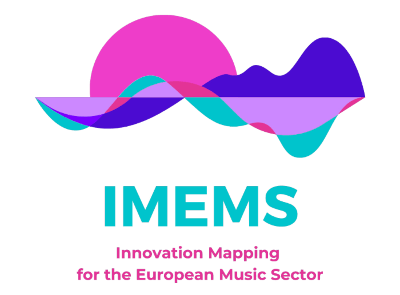Mapping the Future of Live Music in Europe
Empowering Europe’s Live Music and Music Export Sector with AI-Driven Innovation.
IMEMS is an ambitious initiative with the goal to map and assess AI-driven solutions shaping the European live music and music export sectors. This project reveals key industry needs, emerging innovations, and actionable recommendations to align AI tools with real-world practices.
Our report explores how artificial intelligence (AI) can serve as a catalyst for enhancing resilience, efficiency, and creativity within the live music industry. Through a mapping of emerging AI-driven solutions, sectoral consultations, and stakeholder engagement, our research identifies the sector’s key functional, structural, and cultural needs.
We identified five primary categories of
KEY NEEDS
In response, this report provides the following
RECOMMENDATIONS
Context & Mission
Why This Mapping Matters
AI, Innovation, and the Live Music Sector’s Turning Point
The European live music sector stands at a crucial crossroads, facing rising operational costs, evolving audience behaviors, and significant disparities in post-pandemic recovery. These challenges are compounded by the sector’s traditionally fragmented workflows and specificities limiting adoption of technology. By 2030, Europe’s live music sector could be worth 38 billion Euro. IMEMS is here to ensure it grows sustainably and inclusively through innovation.
Industry Challenges
Why the Live Music Sector Needs Innovation
📈 Rising Operational Costs
Venue rental, artist fees, production, and logistics are driving up expenses and ticket prices.
🎭 Changing Consumer Behavior
Digital distractions and economic uncertainty are reshaping how people engage with live events.
🏢 Post-Pandemic Recovery Gaps
Larger venues rebound while smaller grassroots ones struggle, threatening local culture.
💸 Economic Pressures on Consumers
With inflation and debt rising, people are cutting back on entertainment spending.
AI Mapping & Use Cases
AI Meets Live Music: Our Approach
Tools. Needs. Innovation
HOW WE DID IT
The 3 steps we followed
Industry Voices & Sector Needs
What the Sector is Saying
Insights from Industry Professionals.
A crucial part of the project was gathering direct input from live sector professionals across Europe. This is what some of the stakeholders are asking for and how they believe AI can meet those needs.
Viot Pascal
Director of iSSUE - Security Director at Paleo Festival
Malika Séguineau
General Manager Ekhoscènes
Jess Partridge
Executive Director EMMA
Strategic Recommendations & Future Outlook
Where Do We Go From Here?
Building an Ethical, Inclusive, and Innovative Future
AI alone is not the solution. But combined with sector-driven governance and experimentation, it can unlock value, equity, and resilience for the European music ecosystem. Here’s how we move forward.
Early-Stage AI in Live Music: A Field of Opportunity
AI development in the live music sector is still emerging, offering rich potential for innovation. To unlock this, we recommend fostering collaboration between research labs, industry professionals, and MusicTech networks across Europe. Current advancements focus on infrastructure, marketing, and workflow tools — moving beyond past trends like Web3 or the Metaverse. These solutions can benefit organizations of all sizes and may extend beyond live music to impact theater, events, and the broader cultural sector.
Licensing & Copyright: A Missing Framework
Live performances currently lack a defined copyright framework, leaving AI-related use largely unregulated — a critical gap and opportunity. To address this, we recommend initiating EU and international discussions to create standards for AI use in live shows, including stage design and production. Clear policies are needed to foster innovation while protecting artistic rights and integrity.
Building AI-Ready Live Music Databases
The live music sector suffers from fragmented and inconsistent data practices, limiting AI’s effectiveness. A coordinated effort is needed to develop structured, interoperable databases — including event listings, venue specs, professional directories, and sustainability resources. These tools would enhance AI-driven planning, matchmaking, and resource-sharing across the industry. With clear governance and alignment with initiatives like the European Music Observatory, these databases could also inform cultural policy and connect live music with broader creative sectors.
Training & Capacity Building for AI in Live Music
Live music professionals are eager to explore AI but face barriers due to limited time and resources. To support meaningful adoption, a structured capacity-building approach is essential. This includes creating a European resource center for AI in live music, offering tailored training, tools, and peer-to-peer learning opportunities. By strengthening skills and knowledge across the sector, we can empower professionals to engage with AI confidently and effectively.
Strengthening Research & Innovation in Live Music
Many live music professionals lack the resources to independently adopt AI, making collaboration essential. An open innovation model—linking industry, researchers, and developers—can bridge this gap. By leveraging networks like MusicTech Europe and supporting joint R&D projects, the sector can access tailored AI solutions. Dedicated funding mechanisms are key to making innovation accessible, especially for small and mid-sized organizations.
OUR CALL TO ACTION
By addressing the following key areas, the live music sector can harness AI to navigate its challenges, enhance sustainability, and drive forward a more resilient and innovative industry landscape.
Short-Term Actionable Steps for AI in Live Music
To support practical AI adoption, we propose three immediate initiatives:
1. Foster ongoing dialogue through roundtables and forums that connect live music professionals with tech innovators.
2. Create a curated platform of AI tools, offering guidance and categorized solutions tailored to industry needs.
3. Support pilot projects that test AI in real-world settings, generating insights and building shared best practices.
Mid-Term Policy & Ecosystem Priorities
To ensure responsible AI integration in live music, we recommend:
1. Creating European standards for AI in culture, rooted in diversity, accessibility, and fair remuneration.
2. Institutionalizing collaboration between cultural and tech sectors through innovation hubs and EU-backed partnerships.
3. Ensuring equitable access to innovation with support for small and mid-sized players.
4. Positioning live music as a testing ground for AI-driven cultural innovation, with scalable best practices for the wider creative sector.

GET INVOLVED
Join the Conversation
Connect, Collaborate, Co-Create
The mapping doesn’t end here.
IMEMS is a living project. Whether you’re an artist, venue, live music industry or music export professional, policymaker, or tech provider, your voice matters.
Get in touch and let’s shape the future of the music ecosystem - together.






